If within three days the cat's appetite is not restored and it refuses to drink, it is necessary to urgently consult a doctor, because the risk of dehydration is high. It is also important to visit a specialist if the animal has the following symptoms:
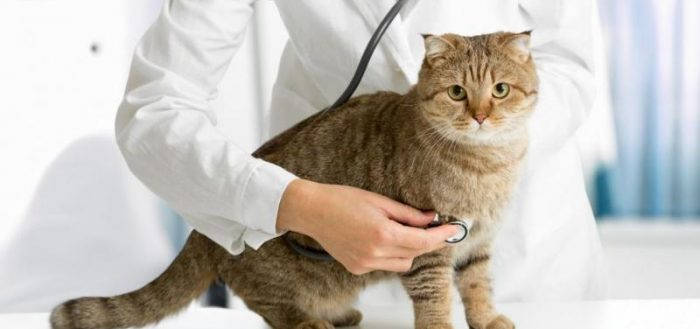
- How long can cats go without food? And 10 reasons why your cat won't eat
- Why isn't my cat eating?
- Food allergies.
- Respiratory problems
- Picky
- Digestive problems
- Stress
- Traveling
- Foreign objects
- Why the cat won't eat or drink for several days
- What diseases may cause
- How to help a cat with an appetite disorder
- Post-operative period, recovery from illness
- Helminth infestation
- How to help your pet
- Before a visit to the veterinarian
- Preventive measures
- The main reasons for a cat's refusal to eat
- Stress
- Dietary changes
- What to do if the cat does not eat
- Treatment and help
- Put a small amount of food on the cat's paw or muzzle
- Feeding with a syringe
How long can cats go without food? And 10 reasons why your cat won't eat
Cats can be very picky about food and how and when they eat. Even with a huge selection of wet and dry foods, your finicky cat may turn his nose up at your carefully prepared meals. If you have a finicky eater or your pet has a sudden change in appetite, you may be wondering how long cats can go without food.
If your beloved pet doesn't eat for 24 hours, that's a signal that you should monitor your cat for signs of malaise, pain and other signs of illness. If your cat doesn't eat for 24 hours but drinks water, experts say it won't have serious problems. Without food and water, cats can have serious health problems in as little as 24 hours.
If the hunger strike continues for more than a day, call a veterinarian immediately for a checkup. After three days of no food, the cat's fat begins to break down, leading to serious health problems. This timing may differ in feral cats whose bodies are not adapted to eating regularly.
Why isn't my cat eating?
The list of reasons why your cat suddenly stops eating or has a decreased appetite is long. Noting unusual behavior or other symptoms will help your veterinarian understand the cause of the change in eating habits.
Food allergies.
Food allergies are not easy to identify without the help of a trusted veterinarian. If you notice unusual symptoms, such as lack of appetite, skin problems, or upset stomach, and they occur within weeks of a change in diet or the introduction of a new treat, it may indicate an underlying food allergy.
Respiratory problems
A stuffy nose is no fun, especially for cats who rely on their keen sense of smell to stimulate appetite.
Picky
Cats can be very picky eaters. Any taste, texture or smell of food can cause your cat to skip a meal. If, within 24 hours, your cat's assortment of favorite foods is not producing an appetite, it's time to see your veterinarian.
Digestive problems
If your cat is experiencing any gastrointestinal distress, such as nausea, vomiting, diarrhea or abdominal discomfort, she may not want to eat or drink. Unfortunately, the lack of food and water can make the condition worse.
Stress
Cats don't like change, it can cause stress, which can cause the cat to refuse to eat. If you know there has been a change in the house and your cat looks scared or is hiding and not eating, you need to find a way to calm her down as soon as possible.
Traveling
Any change in your cat's routine can cause stress, decreased appetite, illness and other conditions. The very movement of a car can cause motion sickness, leading to short-term nausea and loss of appetite.
Foreign objects
Large amounts of hairballs and other foreign objects, such as threads, can clog your cat's digestive tract. If you think your cat has swallowed a foreign object or has lost her appetite, is vomiting or feels pain, see your veterinarian immediately.
Why the cat won't eat or drink for several days
A pet may be refusing food and water due to a number of factors. The most common reason is that you don't feel well. It is possible with stress, which is associated with a sudden change of environment, repairs, noisy parties, etc. Cats are very sensitive to any changes, so the body may react in this way.
In some cases, the provocateur of the problem is unpalatable food. If there was a sudden change of diet, the pet may not react in the best way. Especially if the food is cheap and of poor quality. In this case, the problem can be solved very simply – you need to return to the usual diet.
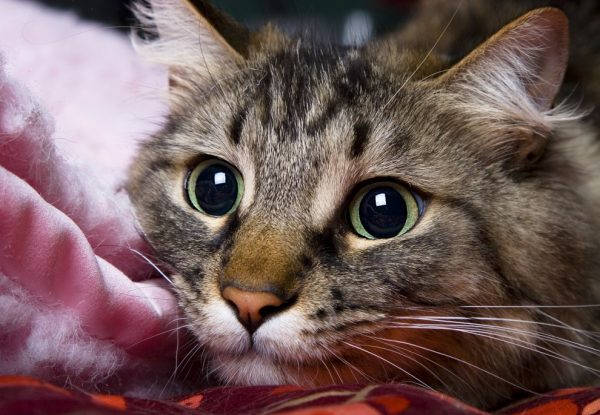
A stressed cat may not eat or drink for several days
Kittens may refuse food and water due to gastrointestinal disorders. The fact is that the little cat has a weak immune system, and any error in diet may provoke disorders of digestive function, which is accompanied by poor appetite and liquid stools. Additional factors: hypodermic mites, fleas and other parasitic infections.
Attention! If the pet does not want to eat and drink, the first thing to look at is the coat and skin, which should be normally clean. Then you should pay attention to the cat's nose. If it is moist, the temperature is within normal limits.
A sick animal may refuse food and water during the exacerbation of the inflammatory process, as the body fights the pathology. Such abstinence from food often does not exceed a few days. Additionally, the pet may have an elevated body temperature. After the fever disappears, the appetite is quickly restored. In this case, it is important to find out what disease has provoked the onset of symptoms.
What diseases may cause
The following diseases can provoke loss of appetite and refusal of water in cats:
- malignant tumors – can be asymptomatic for a long time, most often affect older animals, which begin to lose weight rapidly and prefer a sedentary lifestyle;
- renal insufficiency – may occur in a cat at any age, the cat rarely goes to the toilet and urine is excreted in small amounts;
- worm infestations – this is a common reason for the loss of appetite at any age, in addition there are often such symptoms as stool disorders, weight loss, hair loss, vomiting, etc;
- Fungal diseases – accompanied by poor appetite, refusal of water, hair loss, rashes on the skin, itching and a general unsatisfactory condition in which the cat refrains from mobile games;
- Intestinal obstruction – can be a consequence of lumps of hair, worm infestation, and the pet does not go to the toilet, trying to hide.
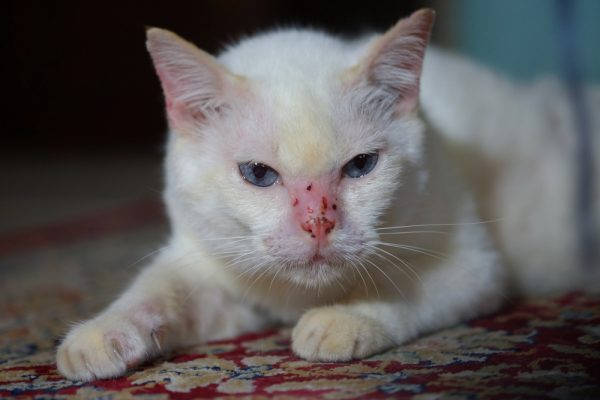
Fungal diseases in cats can cause loss of appetite
Cats may refuse food and water during heat, which is associated with hormonal changes in the body. As a rule, appetite is restored within a few days.
The cat of an acquaintance suddenly lost its appetite and drank very little. At first she thought it had something to do with the intense heat. Then the cat began to hide and lost a lot of weight. When I went to visit her and called the pet, he came out of hiding. He was terribly skinny, barely sitting up. Suddenly, I found a sore on his withers and no fur in that area. I told him to go to the vet right away, because I suspected a mite. I recommend that you carefully examine your pets if they have poor appetite and refuse water. The provoking factors are not always as harmless as they may seem at first glance. Now the cat is almost completely recovered, but still requires long-term therapy.
How to help a cat with an appetite disorder
If there is reason to think that anorexia is caused by an illness, see a doctor as soon as possible so that you don't waste time.
If it is a matter of fussy eating, try to find a more appetizing and better quality food.
Check if there are any sources of stress in the house for the pet. Consider how to eliminate them. Contact a pet psychologist if necessary.
Tone and appetite may also be decreased after surgery or medication. Many medications affect the sense of smell, worsening appetite as well. At older ages, the sense of smell also becomes dulled, which affects food intake.
In some chronic diseases, the appetite of the animal may be permanently impaired. Such a symptom is common, for example, in chronic kidney disease (CKD). Unfortunately, this disease is incurable, but with early diagnosis, proper medication and nutritional support, the quality of life and life expectancy of a cat diagnosed with this disease increases. Doctor will choose therapy and measures, which will help to slow down progression of the disease, and the owner has only to observe these recommendations and to provide the cat with good daily care – in particular, to buy dietary food (diets for cats with kidney diseases usually have high taste), and also to watch how much the cat eats, as it should not starve. Here's how you can increase your cat's interest in food.
- Choose a diet that is more appealing yet dietary. There are special veterinary foods for sick and old pets. They are very appetizing and are often available not only in dry but also in wet form, which is very important for weakened, old, suffering from dental disease animals who cannot eat dry food.
- Wet food can be heated to 37-38 °C, no more. This will enhance the release of flavors and make the food more appealing. It is better to heat it in a water bath. If you do microwave it, knead and stir the food thoroughly with a fork, otherwise the cat will burn himself: microwaves sometimes heat unevenly. Try steaming dry food with warm water (60°C) in a 1:2 ratio, then kneading it to a smooth mass and cooling it to body temperature. Soaked dry food (as well as wet food) can be in a bowl for no more than one hour, after which the uneaten product should be discarded.
- You can lightly sprinkle the food with broth.
- It is important to make sure the cat is comfortable while eating. Sometimes the presence of the owner can be beneficial, and feeding from the hand will support some animals who would not eat on their own.
Post-operative period, recovery from illness
If the cat has undergone surgery, including castration or spaying, its appetite may be impaired at first. In this case you should not put your pet on a starvation diet: if it shows interest in food you should not refuse it. True, feeding in this case should be small portions.
Often they are the reason for refusing to eat: the cat is simply painful to eat food. To prevent oral disease, you should brush your cat's teeth once every 2-3 days with a toothbrush and toothpaste specially designed for four-legged animals. toothbrush and toothpaste. It is important to accustom your pet to this procedure from an early age. Alternatives include offering your cat Dental treatsBut they should not be abused.
Helminth infestation
Helminths parasitizing in pets release toxins that cause inflammation in the intestines or stomach. This leads to painful sensations, resulting in poor appetite, vomiting, stool problems, deterioration of hair and skin quality.
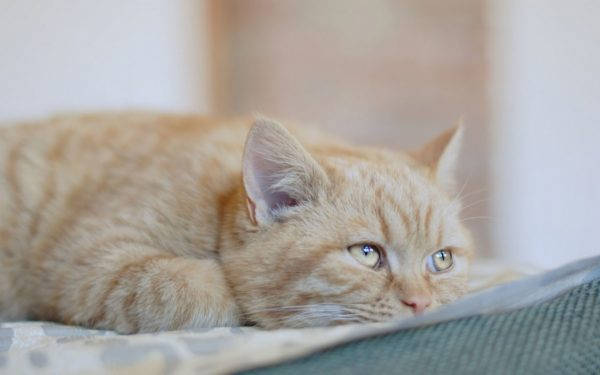
In order to avoid internal parasite infestation, the cat should be regularly given antihelminthics. They come in the form of tablets, suspensions, drops on the withers. The remedy is selected by the veterinarian individually. It is important to record the date of the last treatment in order not to miss the next one.
How to help your pet
The best way to help a pet is to see a doctor. The exception may be situations where you are certain that the condition is caused by stress. For example, a recent move to a new place of residence or the arrival of a new pet or family member. But here, too, your cat needs help. There are special medications that can help your cat to calm down more quickly and get into a normal routine (such as Cot Baiun infusion, collar or Feliway spray).
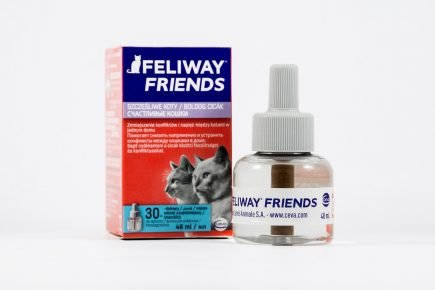
Feliway is a specially formulated feline pheromone that helps to normalize a cat's behavior when he or she is under stress.
Before a visit to the veterinarian
Before the visit to the veterinarian, owners should take steps to help reduce the distress of their cat:
- Provide peace and quiet, remove light stimuli (darken windows).
- If possible, isolate it from other pets (if there are any in the house) in case of an infectious disease.
- Put the pet on a clean bed, not too soft, but comfortable.
- Place clean water and some of your pet's favorite food next to it.
- You can force feed the cat from a syringe without a needle (2-3 ml every half an hour). This should always be done if the pet has diarrhea or vomiting or if the patient is a kitten.
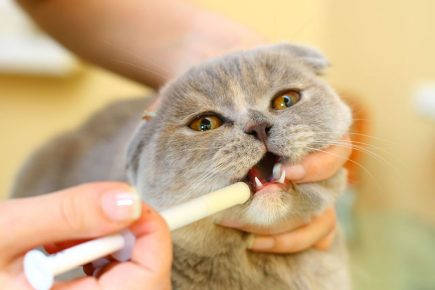
Syringe feeding is a necessary precaution against dehydration.
Do not give any medications on your own without a veterinarian's recommendation. They may suppress symptoms and make it more difficult for the vet to understand the true cause of the cat's illness.
The vet can be called for a consultation over the phone. He will not make a diagnosis over the phone, but he can give some professional advice that may help the animal before coming to the clinic.
Preventive measures
Not every situation can be foreseen by the cat's owner, but a lot is in his power to prevent the deterioration of the pet's health:
- Ensure that water and food bowls are clean;
- Switch to the new food ration gradually (7-10 days);
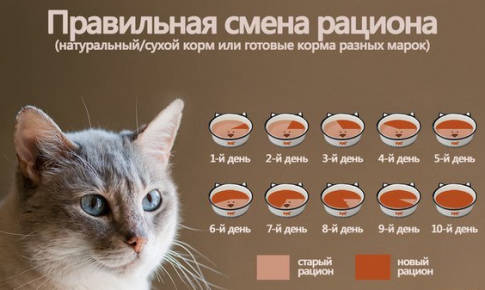
When transferring to the new diet, only 10% of the usual food is substituted each day.
Only a careful attitude to the animal will allow the owner to notice the symptoms of ill health in time. If the pet does not eat and drink, has signs of ill health, then there is no need to treat it at home. First of all, you should go to the veterinarian to identify the cause of this state of the cat, and then prescribe adequate measures to treat the pet.
The main reasons for a cat's refusal to eat
- Stress.
- A change in diet.
- Thermoregulation.
- Sexual instinct.
- Pregnancy.
- Parasites.
- Diseases of the oral cavity.
- Poisoning.
- Foreign body and hair in the stomach and intestines.
- Viral infection.
- Liver disease, kidney disease and urolithiasis.
- The postpartum period.
- The effects of anesthesia.
Stress
Cats are just as stressed as, or perhaps even more stressed than, humans. Moving to a new place of residence, a new bowl, rearranging the room, repairs, a business trip of the owner or mood swings of the owner are all stressful situations for the pet.
Even the arrival of guests or a quarrel between family members can affect the cat's well-being.
During stress the cat is not active, it is apathetic, it does not want to play with its owner, it does not eat well or refuses to eat at all. In such a situation, you don't need to force the cat to eat, refusing to eat for a couple of days is the norm.
Increased attention to the cat from family members, affectionate treatment, and new toys will help in stressful situations. In severe cases, a consultation with a veterinarian is necessary, who can prescribe the pet sedatives.
But, be careful: the cause of stress may be the onset of illness.
Dietary changes
New food is stressful in itself. Cats are very picky eaters and are sensitive to any change in diet. A sudden change from one type of food to another, changing the brand of dry or wet food, can lead to the animal "going on a hunger strike.
The animal does not understand that the new food is of better quality and cannot appreciate the owner's efforts. The cat is used to certain foods, so any unfamiliar food it declares a "boycott".
Watch the condition of the animal, if the cat looks healthy and drinks water in sufficient quantities, then you should not worry much about such "starvation".
What to do if the cat does not eat
In each specific case, when the cat stopped eating his favorite food, the behavior of the owners and treatment must be individual and reasonable.
The first rule – You should not seek to feed the animal by force before you have not figured out the exact cause of the "hunger strike".
Feeding with a syringe or from a spoon is allowed only if prescribed by a doctor. The exact diagnosis can only be made by a veterinarian. If the doctor detects a disease, he will prescribe treatment.
If the cat refuses to eat not because of illness, do not panic – the appetite will return to the animal without human intervention.
Treatment and help
Due to the fact that there are many reasons for refusing to eat, only a qualified specialist can accurately diagnose the problem on the basis of laboratory and clinical tests. The animal is given a thorough clinical examination, including auscultation and palpation, as well as thermometry. The doctor then prescribes:
After determining the reason why the cat has started to lose weight and lost interest in food, the veterinarian develops a treatment regimen depending on the cat's age, weight and breed.
First of all, it is necessary to eliminate the cause that caused the changes in the body. If the cause is an accumulation of hairballs in the stomach, special pastes are prescribed that contain substances that help the hairballs to pass through the digestive tract. For preventive purposes, such remedies should be given regularly to the animal, especially to long-haired representatives of domestic cats.
Food refusal associated with sexual attraction is not treatable. Prevent manifestations of this kind can be prevented by spaying an animal that has no breeding value. In addition, timely sterilization of cats prevents the development of other serious diseases due to hormonal imbalances (ovarian or uterine cancer or pyometra).
Infectious or bacterial diseases causing loss of appetite and sudden thinness should be treated when the pathological process is more advanced. Infections caused by bacterial foreign microorganisms are treated with antibiotics chosen according to the sensitivity of the bacteria.
It is also important to strengthen the general immune forces of the body. To maintain the health of the cat at the proper level, it is necessary to give quality food and vitamin supplements.
In order to prevent diseases such as rabies, plague, infectious peritonitis, it is important to immunize according to the vaccination calendar. If your pet displays symptoms of sickness (lethargy, aggression, refusal to eat) you should contact your veterinarian as soon as possible to get an accurate diagnosis.
Put a small amount of food on the cat's paw or muzzle
Being a cleaner, she will feel the need to lick herself, and once she has washed herself, she will eat the food. This is also a good way to give medication in the form of food pastes.
The safest are B vitamin injections, they increase appetite naturally and have no side effects – except a burning sensation when injected – it must be done quickly. In difficult cases, the veterinarian may prescribe medications such as Relenium or Peritol, but these have side effects and should be used briefly and only in difficult cases.
Feeding with a syringe
This is a last resort when there is no other, more peaceful way to persuade the cat to eat. A 5-10 ml syringe is best. Mixed fodder with water or semi-liquid nutritive pâté injected directly into the cat's mouth, gently placing the plastic end of the syringe at the side of the muzzle and injecting small portions onto the tongue, giving the cat time to swallow. An adult cat should eat at least 5 ml of food in one sitting in this way. Repeat feedings every 3-4 hours or so, depending on how much your pet is able to eat at one time.
Be gentle but firm, act effectively and painlessly. Do not force the contents of the syringe down the throat, as the cat might choke, but on the back of the tongue and give it time to swallow the food. Talk to the cat in a calm voice and cuddle it. This will help relieve stress. But don't drag out the feedings indefinitely either. You will see for yourself that this method works and, most importantly, has already saved more than one cat's life.






